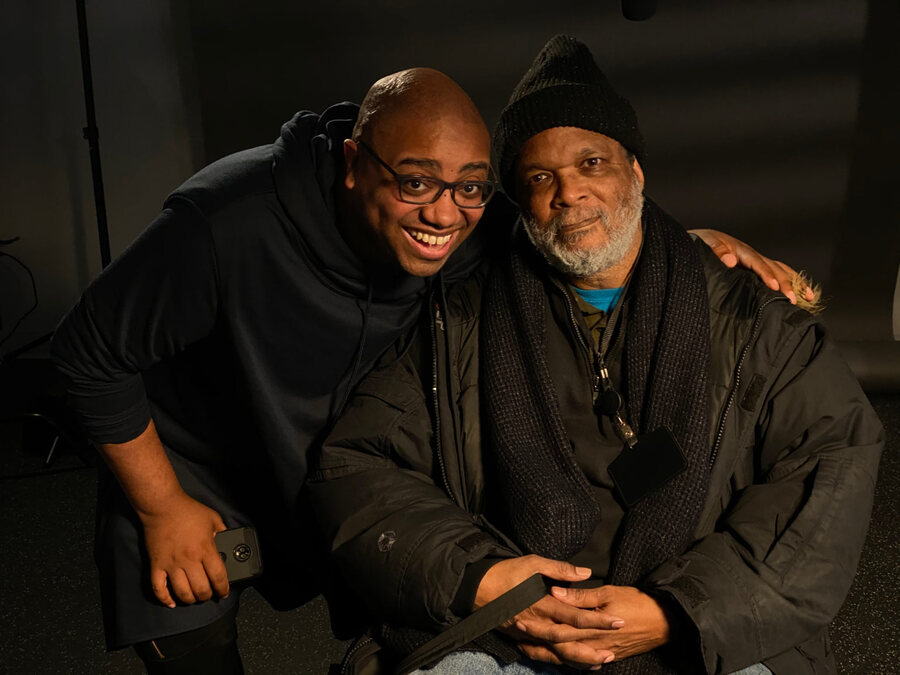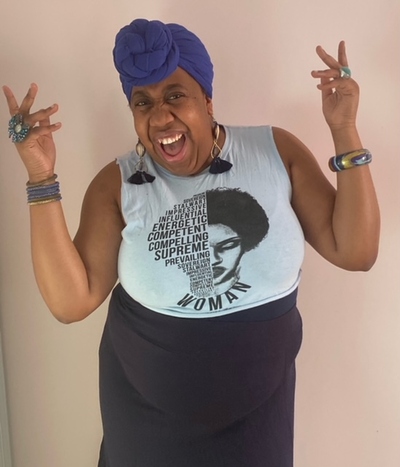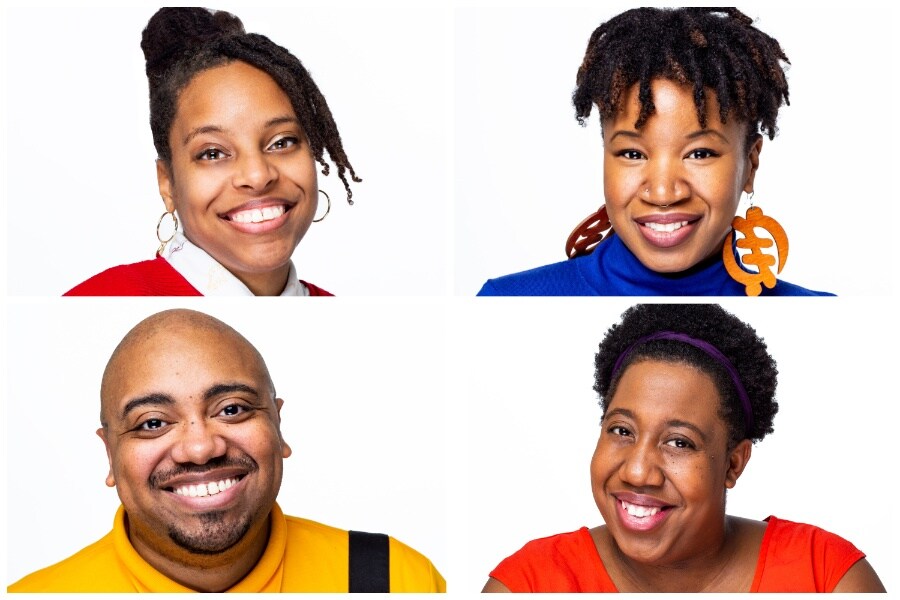Even in ordinary circumstances, being a Welder is an out-of-the-ordinary experience. The D.C. playwrights’ collective was established in 2013 with a unique model: Every few years, a new cohort of writers and artists cycles in, shares in the management of the organization and production of each other’s work, and hands it off to the next crew. In January of 2020, Welders 3.0—Cat Frost, Farah Lawal Harris, Teshonne Nicole Powell, Sisi Reid, JR “Nexus” Russ, and Jared Shamberger—made history as the first all-Black cohort, just in time to face down history in the form of the COVID-19 pandemic. With a new group set to take over in January 2024, the remaining members are looking back on a period of invention, tumult, and growth.
Collaboration is a core value of The Welders that extends right down to the application process. Artists must apply as a cohort, noting not only their artistic ambitions but the administrative skills they bring to the table. Welders 3.0 coalesced thanks to a mix of prior relationships—three of the group worked at Young Playwrights’ Theater, for example—and informational meetings conducted by the then-incumbent Welders. One figure who looms large in their origin story, artist and educator Thembi Duncan, moved to Buffalo prior to the start of their tenure, so was not able to be part of the D.C. crew. Still, many of the current group credit her ongoing influence.
The Welders report to a board, the one constant in an organization built on change, but are otherwise responsible for the group’s administrative upkeep and artistic endeavors. 3.0 chose a different path than their predecessors by electing not to have a “designated administrator,” and instead distributed the work among themselves. Jared Shamberger, for example, served as board liaison and worked on events with Teshonne Nicole Powell, who also handled communications; Sisi Reid worked with Cat Frost on development and with JR “Nexus” Ross on community engagement. Who served in what capacity was as much about interest and passion as prior experience. “Where does your interest lie and what do you want to get out of this [experience]?” is how Reid recalls the conversation beginning. For her part, she used her time with the company to build up her grant writing skills.
Right away, the cohort had a sense of belonging that Black theatre artists rarely enjoy, even in a city as rich in Black culture as Washington, D.C. The significance of that has been revealed in small but pivotal things: the ability to show up in a bonnet without it reflecting on one’s professionalism, the freedom to “exhale” that is often difficult to find in predominantly white spaces.
The group also shares a knowledge base that helps them navigate the D.C. scene. “There is a shorthand among us,” says Shamberger. “We’ve all been the one Black person in the room at the production meeting, or at the audition, or whatever the case may be. I don’t have to give you 10 minutes of background on why I feel this way about this particular thing, because you’ve experienced it as well.”
Of course, the group is hardly a monolith. That’s evident in their plays alone, many of which take varying thematic and formal approaches to queer identity. For example, in The B Word, Shamberger weaves together interviews with Black gay men in the D.C. area to explore and celebrate their beauty, challenging the idea that beauty is an exclusively femme concept. Reid’s Rock, Paper, Scissors, a solo dance-theatre piece, uses everybody’s favorite decision-making game to resolve the conflicts among her intersecting identities as a Black queer woman. Frost, meanwhile, plans to mix improv, sketch, and scripted theatre into her play Aimless to unsettle norms about relationships and desire—all part of embracing herself as an asexual, or “ace,” woman.

These plays were innovative enough before the advent of the COVID-19, which forced everyone to reorient their projects—or, in some cases, step away entirely. At the height of the pandemic, Farah Lawal Harris departed to focus on personal needs; though her play went unproduced, her support is still keenly felt. Remaining with the group meant riding the waves of unrest—returning to a mother’s house for the time being, seeking out mental health support—while pivoting to alternative modalities.
Shamberger and Powell, unwilling to risk widespread exposure by staging their plays in person, shifted to film and audio formats, respectively. The painstaking process of reworking Girls’ Night (With Spirits), about a Black millennial woman who finally buys a house only to discover it’s haunted, had Powell juggling phone calls while away on a much-needed vacation. The process forced her to focus less on production standards and awards eligibility and instead on what really mattered. “Recognition is very important and very affirming,” she said, “but I had to prioritize the story that I needed to tell over the way that I wanted to tell it.”
For all the ways they moved in sync, 3.0 were not without their challenges. In 2022, Nexus followed Harris in leaving the collective, citing disagreements over how the organization positioned itself in community engagement and how the board intervened on financial decisions. They departed after completing a D.C.-area tour of their one-person show Crossroads, Detours, and Exits, which meditates in part on their identity as mixed-race (their mother immigrated from the Philippines).
The remaining members accept interpersonal obstacles as part of the work. As Shamberger admitted, when you are on the same page with folks 95 percent of the time, it’s easy to leave that last 5 percent unsaid. Powell, too, confessed that living up to the values of transparency and honesty are easier said than done. “Sometimes you have to expose dark stuff in the corner, which can be burnout, which can be capitalism, which can be resources, your artistry, the balance between being a Welder admin vs. a Welders artist,” she said. “It can’t just be, ‘We love each other, everything is perfect, everything is fine and smiles.’”

The pandemic left a different impression on each member. Shamberger never gave a thought to film before The B Word, but is now looking forward to his next cinematic project. Reid and Frost, meanwhile, are eyeing in-person productions later this year. Reid is keen to take hers on tour, hopefully around the world, while Frost is eager to embrace what she missed most. “[The pandemic] really revealed the magic you miss when you aren’t able to enjoy live theatre the way you have been,” she said. “The audience makes a show different every single night. So I wanted to think about, how do I tap into what is new and fresh each night?”
3.0’s tenure will end at a time when the theatre landscape appears to be changing for the better, but still has a way to go. While more diversity can be seen on stages and in leadership, Shamberger and Reid are quick to point out that very little has changed in terms of funding and criticism, where white money and tastes still predominate. Powell is now pursuing a Master’s in drama therapy at NYU, where she hopes to use therapeutic theatre to heal participants in a way that many well-meaning productions can only claim to do. Frost, meanwhile, said how much she appreciated working with The Welders rather than taking an underpaid job as an apprentice at a regional theatre where they might “give me housing and $300 a month.” The Welders 3.0 showed her that there are “other things you can work toward in pursuit of becoming a playwright.”
Ultimately, it seems that the four remaining members will emerge from this shared experience ready for their next challenges. Before joining The Welders, Reid was not sure her work merited the financial support she garnered while writing grants for the organization. Now, armed with greater skill and belief in herself, she is establishing her own production company, Soul Shine Theater Garden, which will co-produce Rock, Paper, Scissors this summer.
“My storytelling is always connected to my healing in some way, shape, or form,” she says of her work. “So to know that there are individuals and entities and organizations that believe in my work—the sky’s the limit now. That is what I got from being with The Welders.”
Among the group’s final duties has been to vet and select the next cohort, a process they recently completed with the announcement that Rebecca Dzida, Kelsey Nicole Jenkins, Taylor Payne, and Shaquille Stewart will take over as The Welders 4.0. When asked what they expect of the next generation, Shamberger said that he sees their group as nothing more than stewards; this graduating class expects nothing more of the new crew than that they work together—and, hopefully, find ways to thrive in a theatre scene better than their predecessors found it.
Jared Strange (he/him) is a Ph.D. Candidate and Mary Savage Snouffer Fellow at the University of Maryland, as well as a writer, dramaturg, educator, and critic based in Washington, D.C.


